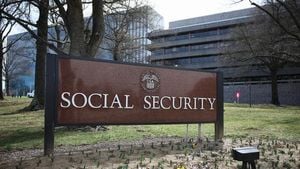Allegheny County Council has recently reached a significant decision, voting to raise property taxes by 1.7 mills to support the 2025 budget. This decision, passed with the narrowest margin of ten votes out of fifteen, marked the first property tax increase for the county since 2011. The approved budget will fund operating expenses estimated at $1.17 billion, addressing long-standing financial shortcomings faced by the county and signaling the end of an extensive two-month budget impasse.
The plan was initially met with challenges, as Allegheny County Executive Sara Innamorato had proposed a more substantial tax hike of 2.2 mills. This proposal faced pushback, prompting council members to counter with their own suggestion of only raising taxes by 1.35 mills. After two months of intense negotiations, the compromise of 1.7 mills was reached, signaling legislative unity to some extent, but also highlighting unease among council members about the fiscal health of the county.
"This budget is everything we need, but not everything we want," said Executive Sara Innamorato following the vote. She emphasized the importance of this budget for maintaining county services without implementing layoffs or drastic cuts, aiming instead to provide stability-in both revenue and expenditures. She committed to auditing spending thoroughly and pursuing methods to improve efficiency without compromising the quality and availability of public services.
Among the 10 council members who voted for the increase, several expressed strong emotional support for the measure, stressing the necessity of funding for vulnerable populations. Councilman Nick Futules shared his heart-wrenching conflicts over budget cuts impacting senior citizens and children. “How can you say no to senior citizens who need us? How can you say no to children?” Futules asked, exemplifying the tough choices tied to the tax debate.
Despite the compromises reached, opposition also emerged. Councilman David Bonaroti cautioned against raising taxes more than necessary, indicating concerns about potential electoral ramifications for the Democratic party. He and several others opposing the tax hike claimed to have heard from constituents highly dissatisfied with the proposal, often expressing frustration over increasing financial burdens. These dissenting voices argue for more conservative budget management or decreased tax increases at a more restrained level.
For Allegheny County, this property tax increase translates to about $1.70 more per $1,000 of assessed value. This means residents with homes valued at the county's median price of around $110,400 will see their annual property tax increased by about $156. While this hike seems substantial, it reflects wider financial issues affecting not only Allegheny County but various regions, particularly due to pandemic-impacted finances and decreasing commercial tax revenue.
The council's passage of the budget acknowledges broader financial changes for the county, attributing some of these dynamics to the prior administration under former County Executive Rich Fitzgerald, who had not raised taxes throughout his twelve-year tenure. Many council members criticized the legacy left behind, describing it as unsustainable and indicative of fiscal neglect.
These budgetary stresses are echoed on the larger political scene too; nearby counties like Westmoreland and Armstrong have raised their property taxes by 32.5% and 33%, respectively, during the past year, highlighting widespread financial pressures. A common theme among these counties is the reliance on federal pandemic relief funds which are set to expire, complicate funding decisions for county budgets moving forward.
Concerns also echoed about future tax increments. Council members like Dan Grzybek have highlighted the importance of fully funding public safety and legal departments, stressing the need for the District Attorney’s Office and the Elections Division to function without disruptions. These sentiments amplify calls for sustained and responsible budgeting to avoid repeating history where fiscal mismanagement leads to more substantial future grievances over tax requirements.
Buffeted between financial responsibility to protect services and pressure from constituents for stable taxes, the Allegheny County Council's recent decisions represent not only immediate budgetary outcomes but also the cascading and often painful realities of managing public funds within the constraints of decreased revenue streams and rising expectations for services. Critics from various factions within the council frame the struggle as indicative of the growing debt problem faced by their government, warning of the consequences should the county fail to turn this fiscal situation around.
Despite the contentious atmosphere surrounding the budget discussions, the council is currently advocating for the impact of restoring human services funding at the Allegheny County Department of Human Services (ACDHS). The department provides key resources to vulnerable residents of the county, including violence prevention and childcare services, meaning funding restoration was viewed as pivotal by many council members. Councilor Grzybek pressed the case for maintaining these allocations, voicing concerns over the broader impact on the community if funding fell short.
Moving forward, the path taken by Allegheny County Council may serve as indicative of the challenges other regions will face as they navigate similar fiscal circumstances. There is growing recognition among council members of the need to be both responsive to constituents’ demands and proactive about cultivating long-term fiscal health. Such oversight will require vigilance and commitment, as well as innovative frameworks to accommodate public services amid dynamically fluctuated economic circumstances.
The recent vote to increase property taxes embodies not just the immediate financial needs of Allegheny County, but also reflects the broader climate of fiscal responsibility and the quest for solutions amid unprecedented economic uncertainty. The fallout from this decision could resonate beyond immediate tax perceptions—it may very well influence how the public engages with their representatives and how future budgets are shaped, guiding conversations around government accountability and community needs.
Being caught between the need for financial solvency and public dissent over increasing taxes, the Allegheny County Council is poised to navigate its legislative momentum carefully. The next steps and subsequent actions taken may evolve and reflect the council's responsiveness to both immediate concerns as well as longstanding fiscal strategies. The pressure remains on council members to chart paths forward and to reflect on strategies for maximizing resources to meet both current objectives and future pursuits effectively.



